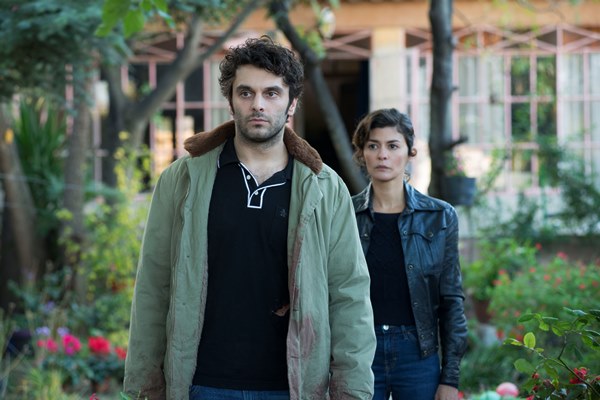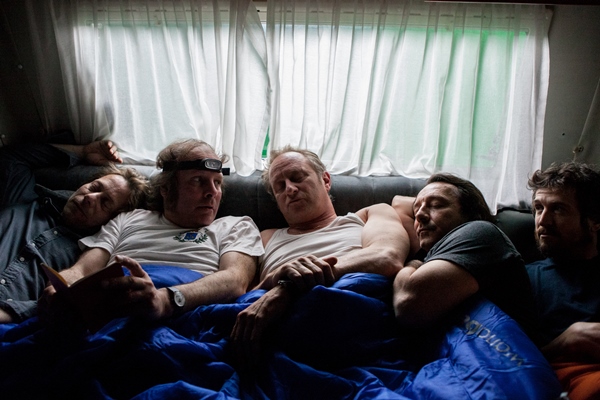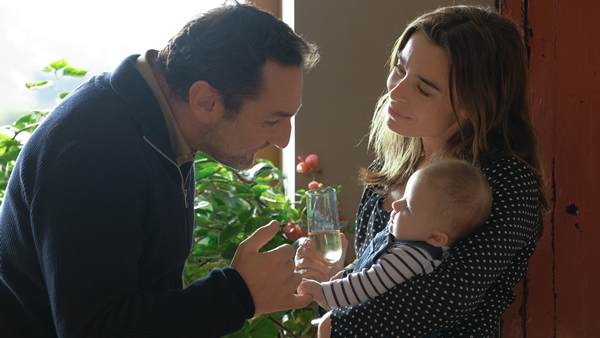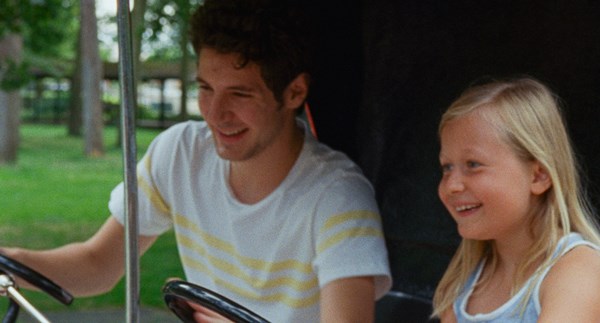
Pio Marmaï and Audrey Tautou in The Trouble with You (All photos: The Film Society of Lincoln Center)
One of the most popular film series annually in New York City, Rendez-Vous with French Cinema offers an 11-day, binge-worthy event to catch filmgoers up to speed on the latest award-winning French films, as presented by UniFrance and the Film Society of Lincoln Center.
The Académie des Arts et Techniques du Cinéma gave out its prizes, the César Awards, last week, and a slew of nominees and a few winners pop up in this year’s program. Based on viewing 11 of this year’s selections, the festival leans more toward narrative films than the esoteric head-scratchers of previous editions, though the droll and unpredictable Quentin Dupieux (Rubber, which starred a rubber tire) brings his latest, Keep an Eye Out!
My favorite selection of the 2019 lineup is Mademoiselle de Joncquières, which beautifully holds up upon a second viewing. A caustic comedy of cruelty based on Denis Diderot’s 18th-century novel Jacques the Fatalist, it’s set in the Les Liaisons dangereuses movie-land of mid-18th-century France, a world “built on lies,” according to one character.
Madame de La Pommeraye (Cécile de France, grinning like the cat that ate the canary) undertakes a devious scheme to humiliate her libertine ex-lover, the Marquis (Edouard Baer), who would give Casanova a run for his money. It was nominated for six Césars, but only won for its eye-catching, color-coordinated costume design. In other words, it was snubbed. Certainly a crowd pleaser, it fits in with the other nominees for the top César prize mentioned below. However, of all of the films in the program, this one will be the most widely available so far; it will stream on Netflix in the United States. (The review from Toronto is here.)
Nominated for eight César nominations, including for Best Film, actor, and actress, The Trouble with You (En Liberté!) kicks off Rendez-Vous and flippantly blends romcom and the buddy cop movie with mordant satire. Writer-director Pierre Salvadori does not draw within the lines, going all-out in juggling one genre and then another; for example, the hybrid comedy begins as a violent free-for-all, like an episode from a cheesy 1970s TV cop show. This segment doubles as a bedtime story that Yvonne (Rendez-Vous regular Adèle Haenel) tells her young son. In her telling, she heavily exaggerates the exploits of her son’s father, her late husband, a cop who died on the job and is a local hero in their Riviera town.
Yvonne’s a police investigator stationed behind a desk, itching to be out on the streets. While booking a man who has just been arrested, she first hears of dirt that sullies the image of her saintly late husband: the defendant tells her that her hubby was involved in a fake holdup in which an innocent jeweler named Antoine took the rap and has been serving time for the past eight years. In fact, among the booty of this theft is Yvonne’s engagement ring, which she still wears.
Out of guilt, Yvonne spies on Antoine as soon as he’s freed from the big house. Yet if she thinks she can somehow help him ease back into civilian life or in any other way, she hits a road block as he’s no easy pet project for rehabilitation. The first action he takes after stepping out of prison is to urinate publicly onto the street. He won’t be looking out or accepting handouts; he’s out for his own brand of revenge. To understand Yvonne’s incessant surveillance, it helps that Antoine is played by the shaggy-haired boyish charmer Pio Marmaï.
Though in retrospect, Salvadori’s film is well-structured, it unfolds freely. It’s like riding a seesaw; one moment is light-hearted, the next is disturbing. There are also not too many leading men who are as charming as Marmaï, or as scary. The anti-social Antoine manages to sweep Yvonne off her feet even after she witnesses him beating up an innocent bystander. S&M gear also comes into play (or is that cosplay?).
For all of its twists and turns, the movie remains fleet-footed, even as Yvonne’s actions strain credulity as she shifts from cop to Antoine’s accomplice. With a running gag of a psychopathic killer who can’t get the police’s attention no matter how hard he tries, this is the type of well-crafted comedy that brings to mind the films of Francis Veber (The Valet), who Salvadori thanks in the credits. An additional incentive is the latest performance by Audrey Tautou, as Antoine’s long-patient girlfriend.
Actor Gilles Lellouche directs Sink or Swim (Le Grand Bain), which had the highest number of César nominations, at 10, and came away with one for Best Supporting Actor, Philippe Katerine. It was also the number one French film at the home box office and loaded with homegrown (and Belgian) stars.
Bertrand (Mathieu Amalric) has been unemployed for two years and searches for some direction, while his scornful wife, Claire (Marina Foïs), supports the family in a suburb straight out of Desperate Housewives. Without telling her, Bertrand joins an all-male synchronized swimming team made up of other sad sacks (Guillaume Canet and Jean-Hugues Anglade, to name two other actors in the large cast), all of whom need to get their mojo back. To dilute the testosterone, the script adds two female coaches: chain-smoker and alcoholic Delphine (Virginie Efira), who advises the team to “find your inner woman,” and the hardcore drill sergeant played by Leïla Bekhti, who whips the men into shape, barking orders from her perch in her wheelchair.
If this sounds familiar, that may be because a British film with a similar plot came out last year, Swimming with Men, not to mention a Swedish documentary, Men Who Swim (2010). It’s lightweight, predictable, and a bit improbable for sure, with a pop soundtrack—Paul McCartney, Tears for Fears—that keeps the pace bouncing along.
Another multi-nominated drama, the middlebrow In Safe Hands (Pupille), zeroes in on the step-by-step process of adopting a two-month-old baby boy. It’s yet another film that boasts a large cast of stars that are better known in France than abroad, with Gilles Lellouche—yes, him again, now appearing onscreen—Sandrine Kiberlain, and Élodie Bouchez.
The paperwork for 41-year-old adoptee hopeful Alice (Bouchez) begins actually eight years earlier, when she and her husband first apply to adopt. The otherwise straightforward narrative darts back and forth in time, mainly to depict how she ends up single and at the top of the list of prospective parents of the baby boy. He is given up for adoption after his 21-year-old college student/mother rushes into an emergency room, unregistered, and announces she’s about to give birth.
The film is more on-point when it stays focused on baby Théo and his development—there’s concern that he may have a disability—rather than when it is diverted by the private lives of the baby’s foster dad and a child welfare worker (Kiberlain), who constantly chews gum loudly, whether in front of a foster parent or her boss. The subplots are more distracting than illuminating. And speaking of stars, Miou-Miou, a major presence in the 1970s and ‘80s, has a supporting role. Her daughter Jeanne Herry directed the film.
As the cuddly, observant, and untiring foster dad, Lellouche was nominated for Best Actor. He was joined by fellow nominee Vincent Lacoste for Amanda. Year after year, there are familiar faces throughout this festival, as though French casting directors were employing the same acting repertory. So it is with Lacoste, who also appears in The Freshman at Rendez-Vous. (He can also be seen in Sorry Angel, which was recently released stateside.)
Mikhaël Hers’s Amanda is moving, yet unsentimental, which is quite an achievement considering it deals with a 24-year-old uncle tentatively cementing his bond with his seven-year-old niece, Amanda (the dynamo Isaure Multrier). David lacks what some would call a mission statement. Meanwhile, he works as a parks gardener and handyman at an illegal Airbnb. By this description, the plot might be considered a kitchen-sink drama. However, the film is set against a background of national anxiety. Its semi-dystopian vision contrasts with the straightforward, intimate relationship-building storyline, but to say more would give away too much.
The film really works because of Multrier’s remarkably fluid and open performance. She’s uninhibited like many child actors, but it is rare for someone as young as her to give a performance that is so specific from scene to scene. Lacoste’s performance is also a strong example of how to move an audience: it’s more effective to see a character struggle to fight back tears than to demonstratively emote.
French film fans outside of New York are not completely out of the loop, however. The top César winner, Xavier Legrand’s hard-hitting, slow-burning drama of a lower-middle-class family split apart by domestic abuse, Custody (Jusqu’à la garde), won Best Film, Best Original Screenplay, editing, and Best Actress for Léa Drucker. It also ranked among Film-Forward’s top 10 of 2018 and is available on DVD/YouTube, Amazon Prime, Google Play, and Vudu. Jacques Audiard won Best Director for his bromance among siblings The Sisters Brothers. The bloody western opened in the United States last September, but wasn’t so widely seen, even though it starred John C. Reilly and Jake Gyllenhaal. It also earned honors for its cinematography and art direction. Another Best Film nominee was released last summer, Memoir of War (La douleur), based on Marguerite Duras’s semi-autobiographical account of wartime and its aftermath. France’s submission for this year’s Best Foreign Language Film Oscar, it’s now available on DVD and video on demand.



















Leave A Comment